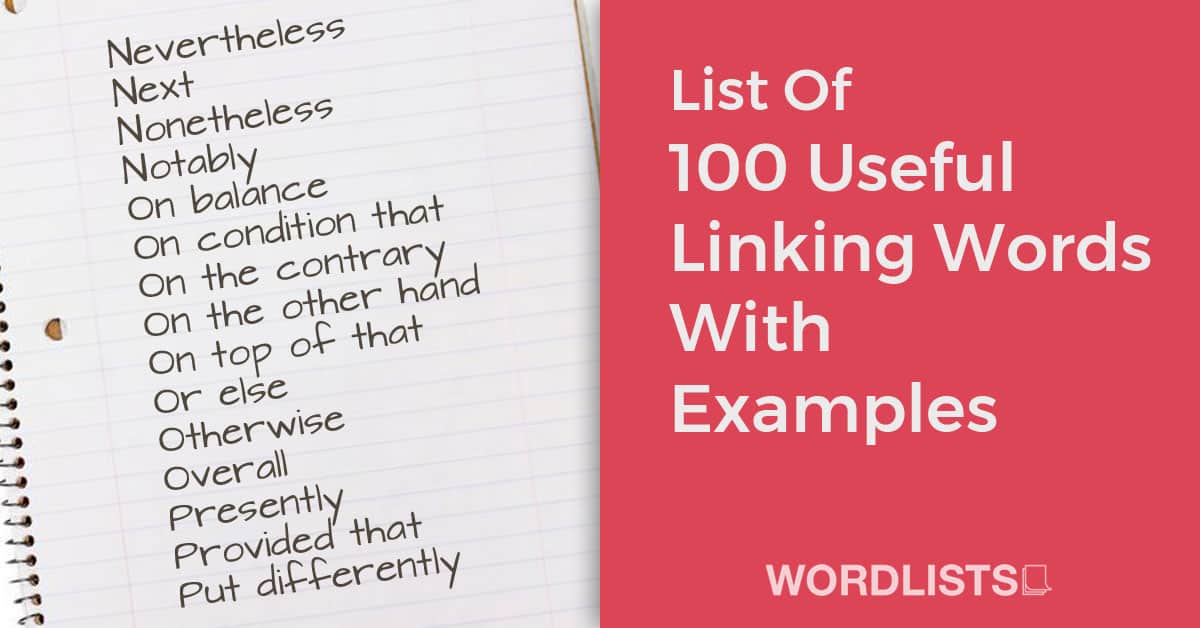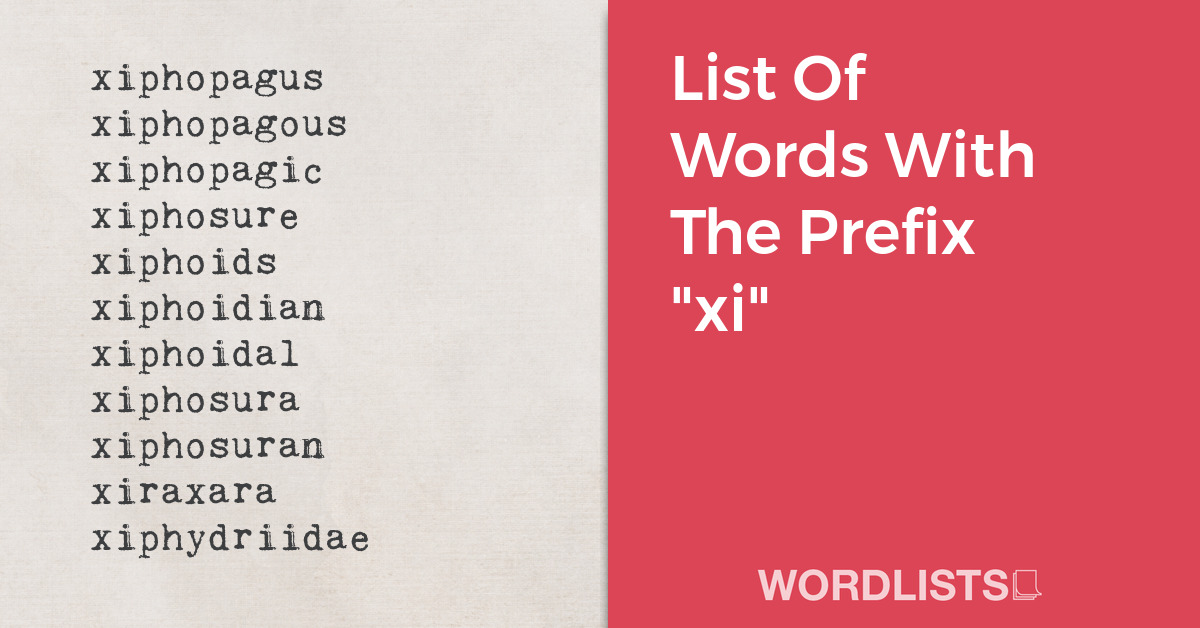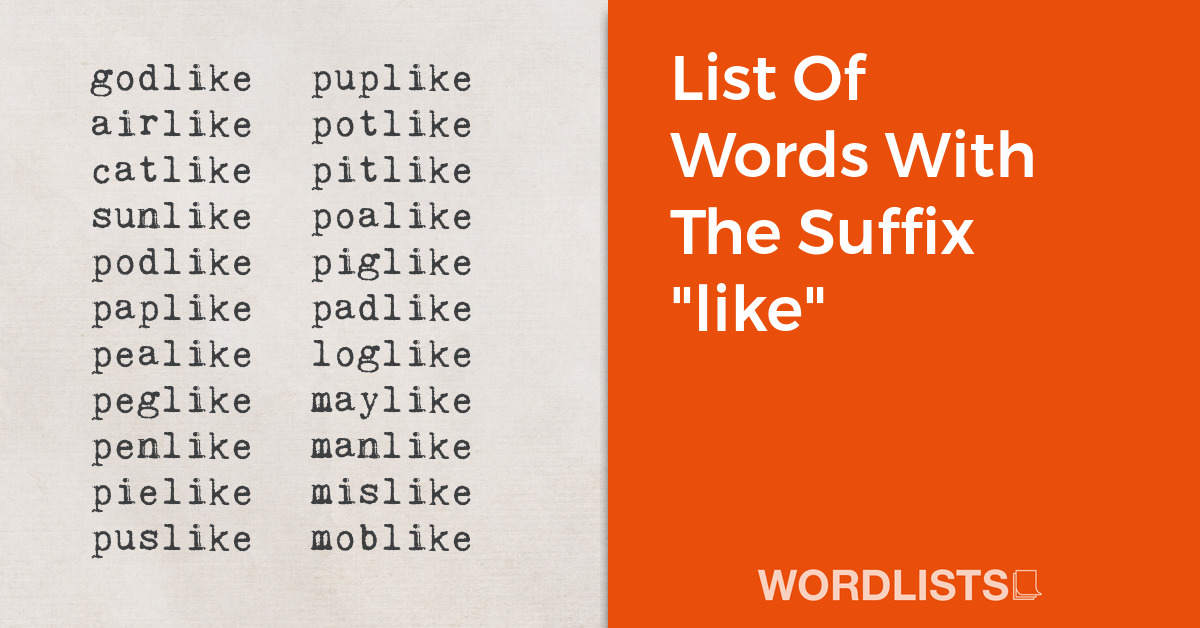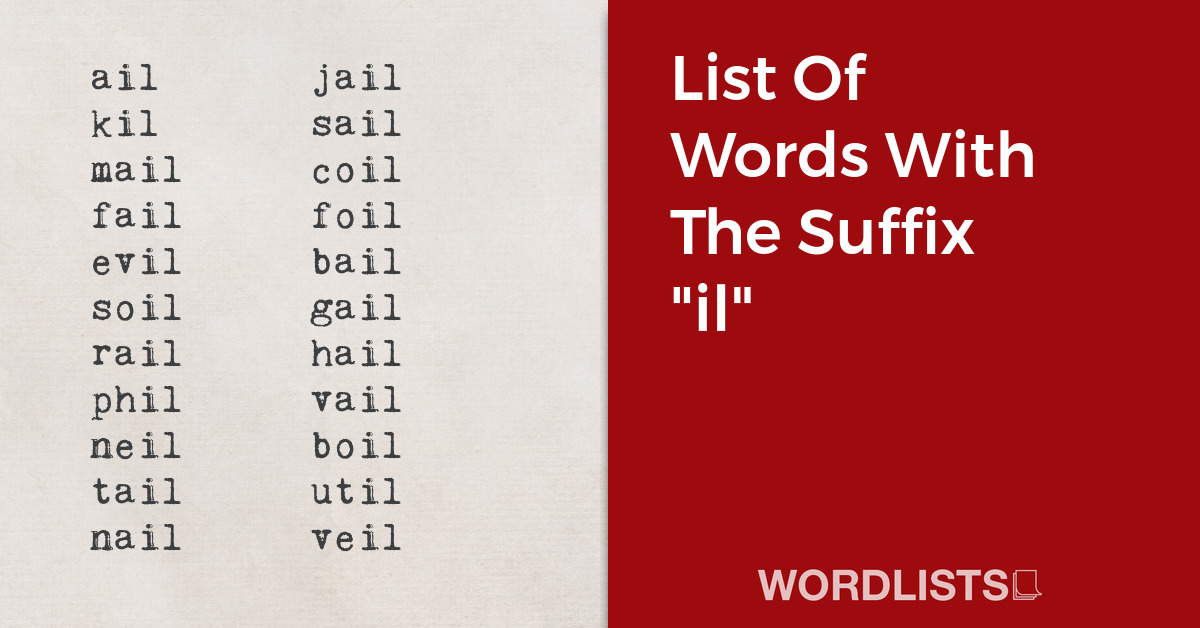Linking words, also known as transition words or connectors, are essential for creating coherence and cohesion in your writing. They help to establish a smooth flow of ideas and provide a clear structure, making your text more readable and engaging.

Subscribe to our mailing list to receive FREE exclusive content and offers!
In this resource, we list 100 useful linking words, along with examples of how to use them effectively in your writing. Whether you’re working on an essay, a blog post, or a business report, these linking words will help you to communicate your ideas clearly and create a well-organized piece of writing.
Additionally – “We need to hire more employees, and additionally, we should consider offering more benefits to retain our current ones.”
Afterward – “We had breakfast at the hotel, afterward, we visited the museum.”
Alongside – “in addition to, or in conjunction with”
Alternatively – “indicating a choice between two or more possibilities”
Although – “Although it was raining heavily, they still decided to go for a walk.”
Altogether – “Altogether, we had a great time at the concert.”
As a result – “The store closed early due to the snowstorm, and as a result, there was a decrease in sales that day.”
As a whole – “The company’s employees work together as a team and support each other, as a whole, they achieve great results.”
Assuming that – “Assuming that the weather is good, we can go for a picnic tomorrow.”
Briefly – “Briefly, let me explain the process.”
By and large – “By and large, the project was successful due to the hard work of the team.”
By comparison – “The new model is faster and more efficient, by comparison, the old model is slower and less efficient.”
Comparatively – “in a way that involves comparison or relating to something else”
Consequently – “The restaurant had a bad review in the newspaper, and consequently, their business decreased significantly.”
Contrarily – “Many people enjoy hot weather, contrarily, some people prefer colder temperatures.”
Conversely – “While some people prefer to work in a fast-paced environment, conversely, others thrive in a more relaxed setting.”
Correspondingly – “The company has invested more in research and development, correspondingly, their innovation has increased.”
Despite – “Despite the challenges they faced, the team was able to deliver the project on time.”
Despite this – “despite the fact that this is true”
Due to – “Due to the pandemic, many businesses have suffered losses.”
Earlier – “before the present time or before a specified time”
Equally – “All employees are expected to follow the company’s code of conduct, equally, there are consequences for those who do not.”
Equally important – “of equal importance or significance”
Equivalently – “in a way that is equivalent or equal to something else”
Ergo – “therefore, as a result”
Essentially – “Essentially, the problem is that we are not communicating effectively.”
Even so – “The weather was bad, even so, we went out for a walk.”
Even though – “Even though it was late, we still went to the party.”
Finally – “We have discussed all the aspects of the project, finally, let’s decide on the budget.”
First and foremost – “First and foremost, we need to ensure the safety of our employees.”
For example – “Many countries have national holidays, for example, Independence Day, Christmas, or New Year’s Day.”
For instance – “There are many ways to exercise, for instance, running, swimming, or cycling.”
For this reason – “The company’s sales have increased, for this reason, they have expanded their operations.”
Furthermore – “The research shows that regular exercise can help reduce stress levels, and furthermore, it can improve overall mental health.”
Hence – “The equipment malfunctioned, hence, we need to order a replacement.”
However – “The plan looks great; however, we need to take into account the budget limitations before we implement it.”
In a nutshell – “In a nutshell, the report suggests that we need to increase our marketing efforts.”
In addition – “The hotel offers a complimentary breakfast, and in addition, guests have access to the pool and fitness center.”
In comparison – “In comparison to last year’s profits, the company has made significant progress.”
In conclusion – “In conclusion, we need to work on improving our customer service to retain our current customers and attract new ones.”
In consequence – “In consequence of the bad weather, the game was cancelled.”
In contrast – “The company’s profits have increased this year; in contrast, they experienced a loss last year.”
In effect – “The new policy has come into effect, in effect, it will change how things work.”
In general – “In general, people prefer to have a stable job with a good salary and benefits.”
In other words – “The company’s profits have increased by 20%, in other words, they are doing better than last year.”
In particular – “In particular, the software is designed to enhance the user experience.”
In short – “In short, we need to work harder to achieve our goals.”
In spite of – “In spite of the challenges, the team was able to complete the project on time.”
In summary – “In summary, the company’s financial performance has improved over the last year.”
In the first place – “In the first place, we need to establish clear objectives for the project.”
In the meantime – “during the intervening period of time, meanwhile”
In turn – “as a result or consequence of something else”
Including – “The price of the meal includes the main course, dessert, and a beverage.”
Invariably – “always, without exception”
Last but not least – “We have talked about the marketing and sales strategy, last but not least, let’s discuss the distribution channels.”
Likewise – “Just as we have strict rules for our employees, likewise, we expect our vendors to adhere to our ethical standards.”
Meanwhile – “The team is working on the project; meanwhile, the manager is attending a meeting.”
Moreover – “The car has great fuel efficiency, and moreover, it has a spacious interior and advanced safety features.”
Namely – “There are four seasons in a year, namely, spring, summer, fall, and winter.”
Nevertheless – “The team encountered many difficulties during the project, nevertheless, they were able to complete it on time and within budget.”
Next – “Next, we need to review the feedback from our customers and make necessary changes.”
Nonetheless – “The weather is very cold, nonetheless, we decided to go for a walk in the park.”
Notably – “Notably, the company’s CEO has won several awards for her leadership skills.”
On balance – “On balance, the advantages of the new technology outweigh the disadvantages.”
On condition that – “You can have the job on condition that you have a degree in the relevant field.”
On the contrary – “The company’s profits have increased, on the contrary, their expenses have decreased.”
On the other hand – “Some people prefer to live in the city, while on the other hand, others prefer to live in the countryside.”
On top of that – “in addition to something else”
Or else – “You have to study for the exam, or else you might fail.”
Otherwise – “You need to arrive on time; otherwise, we will start without you.”
Overall – “Overall, the restaurant had great food, but the service was slow.”
Presently – “at the present time, currently”
Provided that – “You can borrow my car provided that you return it by tomorrow.”
Put differently – “The movie was not successful at the box office, put differently, it did not make a lot of money.”
Regardless – “without taking into account or being influenced by something else”
Secondly – “Firstly, we need to develop the product; secondly, we need to launch it in the market.”
Significantly – “in a way that is important or meaningful”
Similarly – “Studying for long hours can be counterproductive, and similarly, working without breaks can decrease productivity.”
Specifically – “The company’s policies regarding equal pay for all employees are specifically outlined in the employee handbook.”
Specifically speaking – “in a way that is precise or exact, with emphasis on specific details”
Still – “The company’s profits have increased, still, they need to work on reducing their expenses.”
Subsequently – “The company experienced a decline in sales, subsequently, they had to cut costs.”
Such as – “Many fruits are high in vitamin C, such as oranges, lemons, and kiwis.”
That is – “The deadline is next week, that is, we have to finish the project by Friday.”
Then – “We need to hire more employees, then, we need to train them adequately.”
Therefore – “The company’s profits have increased, therefore, they have decided to invest in new projects.”
Though – “The company has faced several challenges this year, though, they have been able to overcome them.”
Thus – “The company implemented a new marketing strategy, thus, their sales increased by 20%.”
To begin with – “To begin with, let’s review the previous month’s sales report.”
To conclude – “To conclude, the project was completed on time and within budget.”
To sum up – “To sum up, we need to focus on our strengths to succeed.”
To summarize – “To summarize, we need to focus on cost-cutting and increasing revenue to improve our profits.”
Unless – “Unless you finish your homework, you cannot watch TV.”
Unlike – “different from, dissimilar to”
Whereas – “The company’s sales are increasing in Europe, whereas, they are decreasing in Asia.”
While – “While some people enjoy working in a team, others prefer to work independently.”
Yet – “The company has not met their sales target yet, they are still working on it.”
More Word Lists
Spotted an error on this page? Please let us know! errors@word-lists.com.







